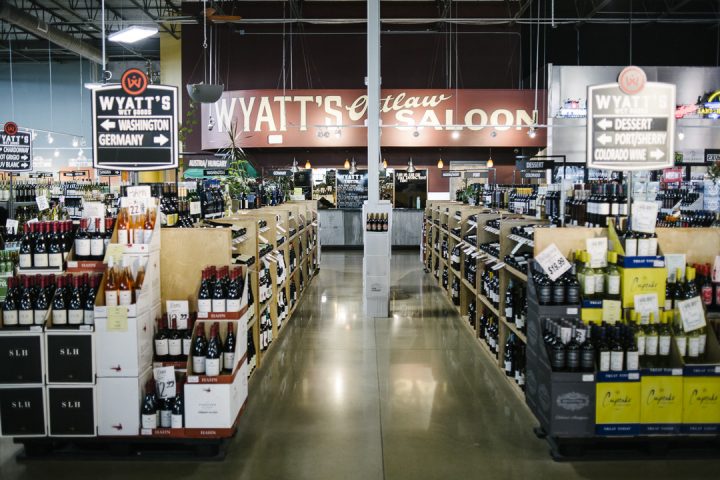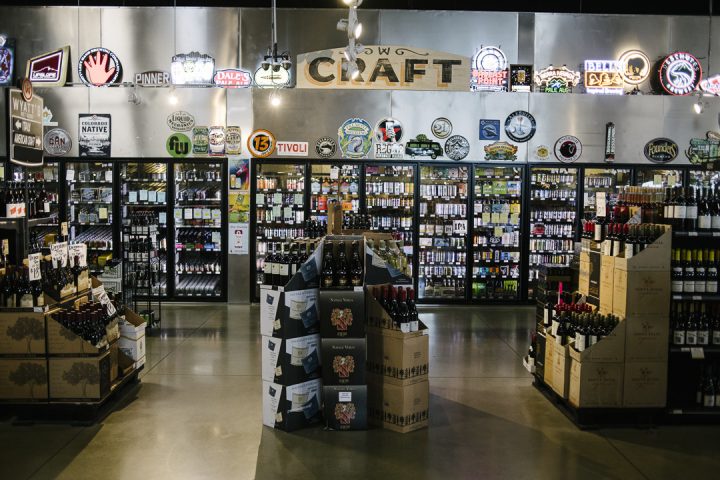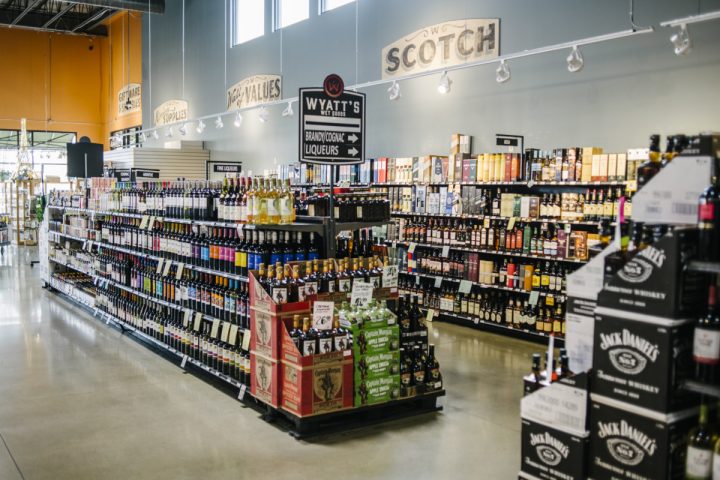
The city of Longmont, Colorado lies 12 miles from Boulder and 30 miles from Denver, part of the expansive metro area on the Front Range of the Rocky Mountains. In 2015, Dennis Dinsmore, a wine and spirits veteran with experience in all three tiers of the industry, launched a Wild West-themed beverage alcohol store in Longmont and named it Wyatt’s Wet Goods.
The timing was right. Dinsmore had sold his Fort Collins store, Wilbur’s Total Beverage, to family members, and an upscale shopping center was under construction in growing Longmont. He snagged a superb location next to a Whole Foods Market, which was due to open at the same time. Dinsmore had visited thousands of stores in his career, which, combined with his retail experience, enabled him to build his ideal store—vast but comfortable, well-organized, light-filled, and energy-efficient. He brought in a longtime friend and former Wilbur’s colleague, Joe Henry, as vice president and managing partner.
Everything was a go until grocery anchor Whole Foods postponed its opening to 14 months after Wyatt’s. Dinsmore, whose title is president and managing partner, says the delay was devastating, but that the store has recovered from its early challenges; distributors praise it as a top performer in the state. Wyatt’s customer base comprises locals as well as tourists exploring Boulder, Rocky Mountain National Park, and Colorado breweries. Shoppers from Boulder pass by several competing stores on their way to Wyatt’s. Dinsmore attributes the store’s success to his staff and the company’s culture of respect and customer care.
“We coach our employees to be themselves while offering top-notch customer service, and that philosophy trickles down,” he says. Dinsmore enjoys working the floor, mentoring employees, and passing along his industry acumen. Holding a bachelor’s degree in electrical engineering from Colorado State University, he considers himself lucky to have landed in the beverage alcohol business. “My college friends are electrical engineers, and they say I’m having way more fun,” he says. “Still, after 52 years in this industry, I can attest that it really is a business.”
Sharpening The Strategy
Wyatt’s occupies 24,000 square feet, three-quarters of which are devoted to retail. The store feels convivial rather than cavernous, even with polished concrete floors, high ceilings, and more than 10,000 SKUs of wine, spirits, beer, food, and accessories. The design embraces minimalism, with little p-o-s. Dinsmore decorated the store with natural wood, Western antiques, and dozens of potted plants to make the space feel inviting. The Wyatt Earp theme and cattle brand-style logo are charming, without veering into kitsch. There are 64 cooler doors—56 of them for beer and the remaining for various wines—as well as a whimsical Isle of Rosé and a wooden fine-spirits structure that feels like a grown-up playhouse. In a light-filled front corner, the barware and accessories section rivals that of many gift boutiques.
In Colorado’s price-sensitive and competitive market, Wyatt’s keeps its pricing down, with 70-100 prices fixed at an everyday low and revolving sales of an additional 100-200 SKUs. Still, the store has an upscale vibe. A grain silo from a nearby farm sits in the middle of the sales floor, and serves as office space. Customers walk through aisles of imported and domestic wines to reach a tasting bar in the back. A window beckons them to enter the fine wine room, which holds more than 200 wines. The store has 28 full-time and 18 part-time employees, all cross-trained in multiple jobs to create efficiency during busy times.

Dinsmore takes an adaptable approach to marketing, and finds a combination of methods gets the maximum result. Friday beer tastings and Saturday wine tastings attract 150-200 guests, resulting in a sales uptick of 15-20 cases. Wyatt’s invests in newspaper and magazine advertising, and also pays to publish a weekly drinks article in the local paper, the Longmont Times-Call.
On the digital side, the store’s app—developed by e-commerce and data platform City Hive—allows customers to shop and arrange for delivery by one of the store’s three trucks. The company engages customers online via Facebook, Instagram, and Twitter, which help drive traffic to its videos on Vimeo. Six times a month, the store’s 12,000 email subscribers receive news on eight sale wines, which are featured on a custom-made cart at the back of the store. Last year, Spanish-language radio station KKJD La Ley broadcast live from Wyatt’s for the Mexican Day of the Dead holiday. Dinsmore isn’t afraid to get creative—following his own advice to try new strategies and stay agile in a changing market, he announced the store’s launch by hiring a plane to fly aerial banners over town.
Dinsmore takes a long view on national and local trends, chiefly consolidation at the supplier, wholesale, and—recently in Colorado—retail levels. He says that distributor mergers, online-only ordering, and a lack of representation for small producers will result in less selection for consumers, noting that some powerful suppliers have forced wholesalers to drop smaller brands, which has hurt Colorado craft producers. Still, he embraces the future and encourages his buyers to get creative. “In order to survive, independent beverage alcohol retailers need to find unique products—our store’s profit centers,” he says. “Today, that’s the job.”

Wine’s Leading Role
Wine dominates the sales floor at Wyatt’s. Most domestic wines are grouped by varietal, while imports, Oregon, and Washington wines are shelved by region. In each section, the wines are alphabetized by brand. Wyatt’s carries 4,658 wine SKUs, from Vendange Chardonnay ($4 a 500-ml.) to the 2014 Hundred Acre Kayli Morgan Vineyard Cabernet Sauvignon ($500 a 750-ml.), with most falling in the $15-$25 range. The two top-selling wines are the 2016 Kendall-Jackson Chardonnay ($13) and La Marca Prosecco ($16). The two strongest categories are sparkling wines and domestic red blends such as the 2014 The Culprit ($20) and the 2016 Ménage à Trois California Red ($11). Champagne has a strong presence, including Taittinger ($53), as well as prestige labels like the 2009 Louis Roederer Cristal ($260).

Dinsmore’s long relationships with suppliers give him access to rare and allocated wines that other retailers would be unable to acquire. Wyatt’s stands out for its prestige Cabernet Sauvignon offerings from Napa Valley, including the 2014 Spire Vérité La Muse ($400 a 750-ml.), the 2014 Spire Cardinale ($300), and the 2016 Premiere Napa Valley Mi Sueño Selección Herrera ($200). The store has also become a destination for super-premium Italian wine, including the 2012 Tenuta San Guido Sassicaia ($230) and the 2010 Valdicava Brunello di Montalcino ($160). Premium-priced Italian reds also perform well, including the 2012 Gaja Promis Toscana ($45) and the 2015 Pio Cesare Barbera d’Alba ($19).
Bordeaux whites and reds in the $15-$20 range are gaining traction in their position near the front of the store, including the 2016 Château de Callac Graves white ($20 a 750-ml.) and the 2016 Château Guichot Bordeaux red ($15). Rosé—both domestic and imported—is a year-round volume driver, and a category where customers look for recommendations. Strong sellers include the 2017 Alexander Valley Vineyards Sangiovese rosé ($13) and the 2017 Hahn Family Vineyards Arroyo Seco Pinot Noir rosé ($23). Pacific Northwest wines are on an upswing, including the 2017 Charles Smith Kung Fu Girl Washington Riesling ($11) and the 2016 Second Growth Willamette Valley Pinot Noir ($23). The store’s rear wall—formerly devoted to jug wines—offers mix-and-match selections, where customers can purchase two wines of similar value for a set price, ranging from $10-$30.
Diverse Beer Selection
After decades of being limited to low-alcohol beer, Colorado grocers gained the right to sell full-strength beer on January 1 this year. The beer scene is nuanced and shifting, and non-grocery retailers are watching the segment carefully before making their next moves. Dinsmore is ready. “We focus on all kinds of beers, from domestic lagers to craft and imported,” he says. “Beer accounts for 25% of our revenue, but this may increase if small retailers close as a result of chain retailers starting to sell full-strength beer.” There’s a downside: The Whole Foods next door and two nearby Walmart stores also began selling full-strength beer on the first of the year. But Dinsmore believes that Wyatt’s will stay in the game with its vast selection of unique and sought-after brews and its knowledgeable staff. Wyatt’s offers 2,475 beer SKUs, from Lost Lake Naturally Brewed pilsner ($1 a 24-ounce can) to the 2014 Baladin Xyauyù Birra Da Divano Riserva Teo Musso ($45 a 500-ml.).
Wyatt’s customers demand interesting brews. The build-your-own mixed 6-pack ($10) ranks as the store’s No.-1 overall SKU, and customers can choose from more than 300 bottles and cans. “It’s not just trial of new products,” Dinsmore says. “Customers love novelty, and they continue to mix and match even after they’ve found their favorite beers.” Colorado craft beers and domestic IPAs are the strongest categories—with some crossover. Eddyline Brewery’s Epic Day double IPA ($13 a 6-pack of 16-ounce cans) and Bootstrap Brewing Co.’s Insane Rush IPA ($10 a 6-pack of 12-ounce cans) lead the category. Stone Brewing’s IPA ($10 a 6-pack of 12-ounce bottles) and Elevation Beer Co.’s First Cast IPA ($9 a 6-pack of 12-ounce cans) are also popular sellers. Local sours are making inroads, including New Image Brewing Co.’s Dyad Kombucha Brett Saison ($11) and Trve Brewing Co.’s Cursed mixed culture sour pale ale ($15 a 4-pack of 16-ounce cans).

Standout Spirits
Wyatt’s stocks 2,376 spirits SKUs, from Platinum 7X vodka ($0.69 a 50-ml.) to The Dalmore 25-year-old single malt Scotch whisky ($1,499 a 750-ml.). The store’s top-selling spirits SKUs are Tito’s Handmade vodka ($33 a 1.75-liter) and Svedka vodka ($20). After vodka, domestic whiskey is the second spirits driver, led by Jack Daniel’s Tennessee whiskey ($25 a 750-ml.) and Bulleit Bourbon ($27). The store carries 325 domestic whiskey SKUs, not counting those from Colorado. Upscale Bourbons are popular, including Maker’s Mark Private Select ($60) and Woodford Reserve ($37). The store offers 238 single malt Scotch SKUs, and the category is expanding in volume; notable labels include The Macallan 12-year-old ($55) and Lagavulin 16-year-old ($77). Mezcal caught fire two years ago, and the category is still growing thanks to such labels as Vago Espadín ($55) and Banhez Joven ($35).
Colorado craft whiskey is a strong and growing category at Wyatt’s, with 85 SKUs. Dinsmore says Colorado spirits sales in general are robust. All types of Colorado spirits are displayed together and sorted by brand, with five diverse facings from Woody Creek ($35-$60) and 11 from Laws Whiskey House ($50-$80). Strong sellers include A.D. Laws Farmers Select Single Barrel Four Grain Bourbon ($75 a 750-ml.) and Stranahan’s Cask Strength single malt whiskey ($65), an exclusive-barrel selection. The store carries approximately seven exclusive barrels, including top-seller Maker’s Mark Private Select and Stranahan’s Cask Strength.

Community Leadership
“We’re humbled by how well we’ve been received in Longmont,” says Dinsmore. “Still, if we expect to receive community support, then we need to be part of the community.” Wyatt’s sells its allocation of Parker’s Heritage Collection whiskies from Heaven Hill at an annual auction, then donates the proceeds to a local nonprofit group. A recent auction raised $12,000 for the Northern Colorado Healing Warriors Program, an organization that advances the well-being of veterans. For the past three years, the store has participated in the Boulder County Fair Craft Distillers Fest, featuring spirits from 35 Colorado distilleries. Last year, the festival raised $10,000 in support of a local 4-H chapter.
The store also collaborates with Longmont-based nonprofit A Woman’s Work, which offers financial support for women in need. Last year, a wine and beer tasting raised more than $11,000 for the organization, and the store has contributed more than $30,000 over the last three years. Throughout the year, Wyatt’s donates ice to nonprofits, often 250 bags or more for large events. And whenever there’s a charity event at the store, Dinsmore himself flips flapjacks on a griddle outside.
“I don’t like to sit still,” Dinsmore says. “I’ll stay involved at Wyatt’s in the future, even if I slow down while Joe Henry leads the business. One person can’t do everything, so I’ve always surrounded myself with a great team.”